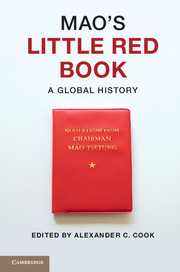Book contents
- Frontmatter
- Contents
- List of illustrations
- List of contributors
- Preface
- 1 Introduction
- 2 A single spark
- 3 Quotation songs
- 4 Mao quotations in factional battles and their afterlives
- 5 Translation and internationalism
- 6 Maoism in Tanzania
- 7 Empty symbol
- 8 The influence of Maoism in Peru
- 9 The book that bombed
- 10 Mao and the Albanians
- 11 Partisan legacies and anti-imperialist ambitions
- 12 Badge books and brand books
- 13 Principally contradiction
- 14 By the book
- 15 Conclusion
- Index
- References
4 - Mao quotations in factional battles and their afterlives
Episodes from Chongqing
Published online by Cambridge University Press: 05 June 2014
- Frontmatter
- Contents
- List of illustrations
- List of contributors
- Preface
- 1 Introduction
- 2 A single spark
- 3 Quotation songs
- 4 Mao quotations in factional battles and their afterlives
- 5 Translation and internationalism
- 6 Maoism in Tanzania
- 7 Empty symbol
- 8 The influence of Maoism in Peru
- 9 The book that bombed
- 10 Mao and the Albanians
- 11 Partisan legacies and anti-imperialist ambitions
- 12 Badge books and brand books
- 13 Principally contradiction
- 14 By the book
- 15 Conclusion
- Index
- References
Summary
Comrades throughout the Party must never forget this experience for which we have paid in blood.
War and PeaceThe rhetoric of revolution was a ubiquitous presence in the Chinese Cultural Revolution. Red Guard papers exploded with such rhetoric. Revolutionary slogans, posters, and plaques were the indispensable props of rallies, demonstrations, and mass meetings. They dotted public spaces. The Cultural Revolution would not have been what it was without its rhetoric. Yet few scholars have examined how this rhetoric may be integral to the revolutionary process. By examining the uses of the Quotations from Chairman Mao, or the Little Red Book, in the Red Guard press, this chapter shows that Mao quotations, and revolutionary rhetoric more generally, were not meaningless propaganda, but a constitutive part of the factional dynamics of the revolution. My analysis will focus on two episodes of factionalism in 1967 in the city of Chongqing, which witnessed some of the most violent battles in the Red Guard movement in the entire country. Armed with Mao quotations, Red Guards and rebels engaged in intense verbal and physical conflicts. The combatants would recite Mao quotations to give themselves strength and inspiration. The escalation of Red Guard factionalism to violence had much to do with the intensification of this rhetoric of revolutionary violence. It seemed as if Mao quotations had taken on an incantatory power. I will argue that they were the core of an entire script of the Chinese revolution. This script took on its power because by the eve of the Cultural Revolution, it had been sanctified. Like the word “revolution,” Mao quotations became holy symbols of the Chinese nation. In the end, Red Guards made a revolution by performing the sacred script of revolution.
- Type
- Chapter
- Information
- Mao's Little Red BookA Global History, pp. 61 - 75Publisher: Cambridge University PressPrint publication year: 2014
References
- 1
- Cited by

